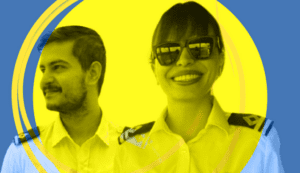July 1, 2022 IMO
(LONDON) — The maritime world is changing, fast. Ships are now operating greener, with greater digitization, and with more diverse crews. As the lifeblood of the shipping industry, seafarers are at the heart of this evolution, implementing new regulations, learning new skills and adopting safer, more efficient working practices. As the world’s merchant fleet traverses the oceans, the crews on these ships continue their career journey.
The International Maritime Organization (IMO) is focusing on seafarers’ experiences, voyages and journeys as the theme of the 2022 Day of the Seafarer, recognized on June 25, drawing attention to how the onboard working environment continues to change. This focus aligns with United Nations Sustainable Development Goal 14: Conserve and sustainably use the oceans, seas and marine resources for sustainable development.

This year’s Day of the Seafarer theme — “Your Voyage, Then and Now, Share Your Journey” — invites seafarers across the world to share images and information about what truly resonates with them — whether a positive experience or challenging circumstances.
“Every seafarer’s journey is unique. Yet many of the challenges and opportunities are shared,” said IMO Secretary-General Kitack Lim. “On this Day of the Seafarer, we can look to the future. Seafarer’s voyages are changing — in the form of new technologies and equipment, increasing use of alternative fuels and further responsibilities for a greener and more sustainable future for the industry and for the marine environment.”
As a former seafarer himself, the secretary-general is aware that maritime journeys can extend beyond being at sea to a career on land, and he encourages all seafarers — past and present — to be a part of the event. “I invite you to share photos from your first voyage and your most recent voyage on social media. We want to see how far you have come in your journey and celebrate your progress,” he said.
Ongoing challenges
Lim added, “On the International Day of the Seafarer … it is important that we all remember the challenges that seafarers have faced over the past two years and are still facing, including difficulties to effect crew changes, lack of designation as key workers and inability to access medical care and vaccines.
“I also remain concerned about the seizure of vessels engaged in legitimate trade outside established legal processes. I urge all member states to use relevant diplomatic channels to resolve their differences so that international shipping and especially seafarers are not unduly impacted. As I have said in the past, seafarers and shipping should not become collateral victims of larger political issues. The welfare of seafarers and the need for international shipping to move freely and unhindered is critical to the continuous operation of global supply chains, for the benefit of all peoples of the world.”
United Nations Secretary-General Antonio Guterres said, “Seafarers worldwide have faced immense challenges stemming from the COVID-19 pandemic — including contracts extended long beyond their expiry dates and maximum periods of service, and challenges related to vaccinations, medical care and shore leave. This year’s theme — ‘Your Voyage, Then and Now’ — is an opportunity to recognize the vital role seafarers play, and look to the future.
“Above all, this means listening to seafarers themselves. They know better than anyone their needs and what this industry needs to do to address key challenges. This includes the expansion of social protection, better working conditions, addressing the crew-change crisis, adopting new digital tools to enhance safety and efficiency, and making this industry greener and more sustainable,” he continued. Read the full speech here.
Join the campaign
As in previous years, the 2022 Day of the Seafarer event will predominantly be held on social media to draw attention to the contribution that seafarers make to shipping and world trade.
Participants in the campaign can use the hashtag for 2022 “#SeafarerJourney” or the regular hashtag “#DayOfTheSeafarer” and join in the conversation.
Seafarers are invited to post two photos using the hashtags: one of their first voyage and another of their most recent voyage. We would also like to know what has changed during your maritime voyage. Is shipping greener? Is the technology better? Are you more skilled? What have you learned?
Supportive organizations, shipping companies and port organizations are also invited to show their appreciation for seafarers by resharing their posts or using the hashtags and discussing the importance of seafarer journeys.
Members of the public are encouraged to post about the many ways in which seafarer journeys benefit their lives (e.g. bringing them food, electronics, medicines, etc.) using the same hashtags.
Photos and posts can be shared on Facebook, LinkedIn, Twitter and Instagram – and tagging the IMO will allow it to view and reshare some of the posts.
– International Maritime Organization





